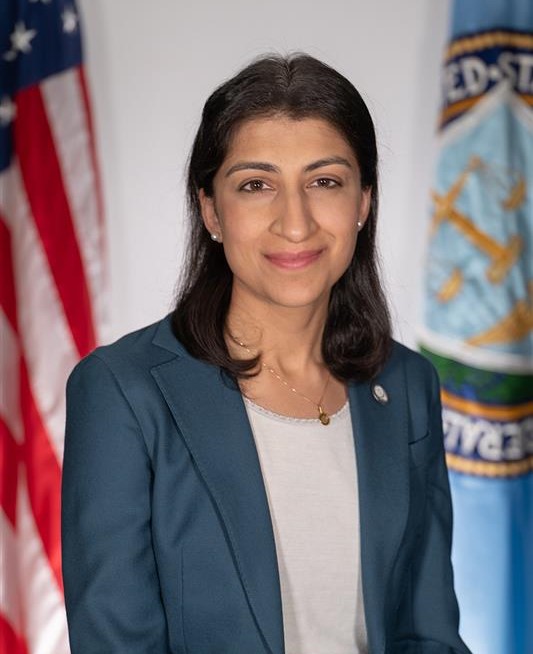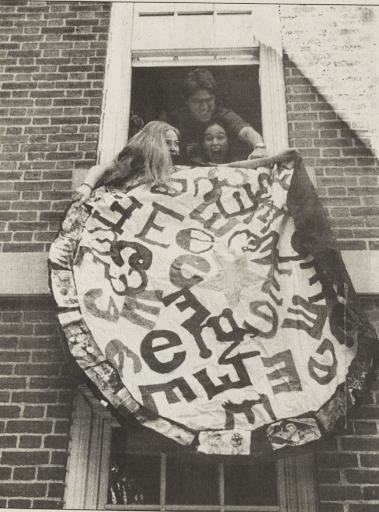
Lina Khan ’10 was beginning her junior year at the College when Lehman Brothers, a global titan of investment banking, filed for the largest bankruptcy in American history, triggering a stock market crash and an economic meltdown that devastated the global economy. As millions lost their jobs and their homes, Khan, a student of economics and political science, watched her course material play out in the news. The experience was formative for Khan, who would later serve as Chair of the Federal Trade Commission (FTC) under President Joe Biden’s administration.
“[The recession] played a big role in my understanding of the role of government … and how economic outcomes are not just some inevitability, but are the results of specific decisions that lawmakers and policymakers have to [make],” she told the Record.
In Khan’s telling, the 2008 financial crisis is a story of “blind spots in the economic orthodoxy” that caused widespread devastation, and a subsequent policy response that harmed ordinary Americans — even, she noted, “when it was not their fault, even when it was the banks that had violated the law and engaged in fraudulent practices.”
Just 13 years later, Khan became the youngest chair in the FTC’s history when Biden appointed her. As one of the most prominent proponents of the New Brandeis school of antitrust — which advocates for a more critical regulatory stance toward market power — Khan’s work as FTC chair was ambitious. Increasing challenges to mergers, banning deceptive pricing tactics, and investigating privacy violations, Khan’s FTC has been hailed as the most proactive in decades.
Khan’s career of scrutinizing power began at the College — namely, during her tenure at the Record, which she described as “formative.” As a news editor and later editor-in-chief, Khan recalls closely monitoring the administration’s decisions. “The Record, and student journalists, play such a critical role on campus in terms of shedding a light [and] scrutinizing decisions that the administration is making,” she said.
As the editor-in-chief of the Record, Khan covered the dismissal of Bernard Moore, a professor at the College with fraudulent credentials. “It was this guy who had a lot of D.C. connections, and he would kind of front those in a way that led people to turn a blind eye to some of the other deficiencies that became clear,” she recalled.
Khan’s time at the College “set the backdrop” for her life after graduation, she said. After graduating from the College with a year at the Williams-Exeter Programme at Oxford and a senior thesis on philosopher Hannah Arendt under her belt, Khan was hired to work at the nascent Open Markets program at New America, a liberal think tank. With Barry Lynn, a prominent anti-monopoly journalist, Khan researched market consolidation for three years before matriculating at Yale Law School in 2014.
At the time, vigorous antitrust enforcement was not in vogue. The field, which traces its roots to the Sherman Act of 1890, has seen several leading ideologies over time. While enforcement was more common in the mid-20th century, the rule of reason and consumer welfare standard — two products of the Chicago school of economics — became dominant features of antitrust beginning in the 1970s. These conventions dictated that market power was not inherently harmful and that antitrust enforcement should target specific practices that raise prices or reduce output for consumers, leading to less frequent enforcement.
By the time Khan earned her law degree, however, antitrust was in metamorphosis — due in no small part to Khan herself. She skyrocketed to the forefront of legal scholarship in 2017 with a publication in the Yale Law Journal. “Amazon’s Antitrust Paradox” — a play on Chicago scholar Robert Bork’s The Antitrust Paradox — defied antitrust orthodoxy by arguing against the consumer welfare standard. While Amazon could provide low prices — which, under the consumer welfare standard, would insulate it from antitrust enforcement — Khan wrote, its consolidation of market power posed pernicious threats to consumers and society that the Chicago paradigm failed to capture.
Her treatise aided the rising tide of the New Brandeis movement, a group of legal and economic scholars seeking to broaden antitrust enforcement, to address the dangers of market power beyond increased prices. When Biden took office in 2021, he appointed the vanguard of the New Brandeisians to key positions of power: To chair the FTC, he named 32 year-old Lina Khan.
In the acknowledgements of her senior thesis, Khan thanked her parents for teaching her “the value of tempering idealism with realism, but not so as to extinguish it.” With this principle, a decade of experience, and an agency of over 1,000 people, Khan got to work.
Even with Khan’s doubts about the consumer welfare standard, she noted that the accomplishments of her tenure at the FTC often still adhered to traditional conceptions of antitrust’s purpose. In August, a federal judge ruled in favor of the FTC to block a merger between Kroger and Alberston’s, two large grocery chains. Khan said the merger would prevent consumers from paying higher monopoly prices.
Khan, however, said that her work at the FTC has extended beyond traditional notions of antitrust. “Our work also touches people’s lives in ways that go beyond just specific dollar signs in their bank account,” she said.
One of those ways, she said, is time. “A lot of the illegal business practices that we go after, especially in our consumer protection work, waste people’s time, and so that’s something that we’ve also become very attuned to,” she explained, citing the agency’s “Click to Cancel” rule, which requires sellers to make canceling a subscription as easy as signing up.
Another ripple effect of antitrust enforcement is data privacy, Khan said. “Protecting people from government surveillance is a part of our Constitution, and we recognize how important that is for people’s liberties, but when it comes to commercial surveillance or surveillance by private companies, those protections have not been as robust,” she told the Record. “We’ve also seen that, when firms don’t have to compete over providing greater privacy to people, that can also contribute to the erosion of privacy.”
Khan specifically cited Facebook’s acquisition of WhatsApp as an example of illegal concentration weakening privacy protections. “[WhatsApp] committed to not selling people’s data, and those privacy protections ultimately vanished after Facebook acquired them,” she said.
The FTC’s enforcement efforts, however, have at times faced backlash. In an especially controversial move, the FTC proposed a rule banning non-compete clauses in employment agreements. These clauses prohibit employees from working for an employer’s competitor after leaving their job. The rule is currently facing an appeal in federal court after a Texas judge struck it down.
Khan defended the rule, emphasizing both the agency’s legal authority and its mandate to promote competition. “These contracts can be devastating for people’s lives,” she said. “They’re literally called ‘non-competes.’” She added that the FTC’s legal authority to issue rules encouraging competition is well-established. “We were acting on enormously strong and clear legal authority, as well as a really fulsome public record of what effect non-competes have,” she said.
Khan also expressed skepticism about the nature of the controversy. “When we think about backlash, it’s really important to understand who is actually opposed to this and where is that backlash coming from,” she said. The FTC received 26,000 comments from people across the country after issuing the rule, 25,000 of which were strongly supportive. “Pretty remarkable, right?” she said. “People are living busy lives. Who has time to actually sit down and submit a comment to some obscure government agency?”
“The whole point of being in government is to be able to use your authorities and tools that Congress has given you to enforce the law, and that makes people’s lives better, and that’s exactly what we did here,” she added.
As President Donald Trump begins his second term, the future of antitrust appears uncertain. Several prominent Republicans — including Senator Josh Hawley (R-Mo.), former Congressman Matt Gaetz (R-Fla.), and Vice President J.D. Vance — have praised Khan’s efforts. Yet plenty of prominent Republicans and close Trump allies, including Tesla CEO Elon Musk, have expressed vitriol toward the New Brandeis movement. Khan emphasized both the potential and the precarity of the future of antitrust in what she called “an incredibly promising moment.”
“There is a real contestation going on in our politics,” she said. “Are we going to go back to policies that are focused on allowing unchecked monopolization, unchecked consolidation, and all of the downstream harms that that can bring, or are we going to instead enforce the law faithfully, as Congress told us to do, and make sure that, when corporations are violating the law, we are holding them to account?” she said.
“Over the last few years, the FTC’s work has attracted strong bipartisan support,” Khan noted. “There are members on both sides of the aisle concerned about how consolidation is hollowing out parts of rural America, making it difficult for independent grocers [and] pharmacists to continue serving their communities.”
Khan added that she is hopeful that the work begun at the FTC under her leadership will continue but noted that, even if it doesn’t, it might not be the end for the New Brandeis movement.
“I think there is a strong recognition, in part, through the work we’ve done these last few years … that economic outcomes are not some inevitability,” she said.
Learned at the College and carried to the FTC, this principle has driven Khan’s efforts to guarantee Americans what she called “a basic sense of freedom.”
“Areas like antitrust can seem arcane, but they can be extraordinarily significant for how much people are paying for groceries, how far they’re having to drive to go to the hospital, [and] whether people have real privacy,” she said. “I think there will be strong public accountability for any future FTC chair, any future FTC, any future administration that instead tries to go back to a world where we’re not holding law-breaking corporations to account.”








